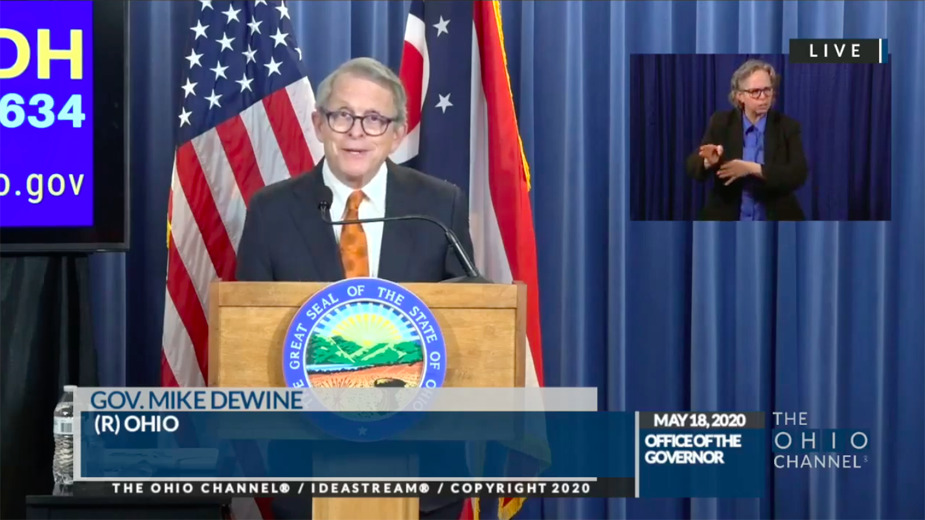DeWine: Pharmacists Can Now Order, Give Virus Tests
COLUMBUS, Ohio – Pharmacists can now order and administer testing to Ohio residents who are symptomatic for coronavirus and restrictions are being eased to allow outdoor visitation at assisted living centers and facilities for people with developmental disabilities beginning June 8, Gov. Mike DeWine announced.
At his press conference Thursday, the governor also said the Bureau of Workers’ Compensation will continue to defer employers’ premium payments for June, July and August. The deferment option will have no financial penalties.
DeWine said he has been working with the State of Ohio Board of Pharmacy to find a way to make testing available at local pharmacies. On Wednesday, the pharmacy board released updated guidance to clarify Health and Human Services rules that will allow pharmacist to order and test for COVID-19, the disease spread by coronavirus.
“Access to these tests is vitally important and I’m working aggressively with the Ohio Pharmacist Association,” DeWine said. “Pharmacies are an important part of our plan to fight COVID-19, especially as we look towards the future beyond testing and towards a vaccine.”
A map of available testing sites is available at the state’s coronavirus website. The map includes community health centers as well as retail sites. The governor said as more pharmacies decide to start testing, those locations will be added.
DeWine said he spoke with Maureen Corcoran, director of the Ohio Department of Medicaid, to have Medicaid cover this testing method, and he said it is a work in progress.
The criteria for testing has been expanded to include a fourth tier that will allow those with symptoms and meet the other criteria already established by ODH to be tested. The first tier is for hospitalized patients with symptoms and health care workers with symptoms. DeWine said nursing home employees and behavioral health workers are covered in this tier.
Tier two is for people at high risk of complications from COVID-19, including residents of long-term care centers and congregate care facilities, patients 65 and older with symptoms, patients with underlying conditions with symptoms, and racial and ethnic minorities with underlying conditions with symptoms.
Tier three allows individuals receiving essential surgeries or procedures that do not require an inpatient hospitalization or admission to be tested.
State officials are talking with hospitals to expand testing and the surgeries that are allowed. However, DeWine said the language is not complete and an announcement will be forthcoming.
DeWine acknowledged restricting visitation to long-term care centers has caused a lot of pain to Ohio citizens before outlining a cautious reopening plan that will be done in stages with careful monitoring and flexibility to adjust. The restrictions do not apply to nursing homes.
The rollback of restrictions will only occur at facilities that are properly prepared. Each site must develop a policy that requires screening for temperatures, reporting symtpoms, scheduled hours and time limits, proper social distancing, face coverings and educational material for residents, family and friends.
“We know this is becoming more and more difficult for people. We know they’ve been away from their relatives and this causes a great deal of heartache inside these facilities with the individuals who are the residents, but we know it also causes a lot of heartache for individuals who want to come in and visit them,” DeWine said.
The governor said the issue is difficult because COVID-19, the disease spread by the coronavirus, spreads quickly with devastating effects to senior citizens and people with chronic medical conditions.
Considerations for visitation during end-of-life circumstances also will be expanded and facility staff should not wait to contact family.
Junior fairs can go on as long as guidelines from the Fair Advisory Group are followed and county fair boards and agriculture societies work with local health departments. DeWine said the decision to hold county or independent fairs rests with local officials and will be allowed as long as all safety guidelines are followed and animals are kept safe.
“Conditions may change over the course of the summer, however, we are asking all fair boards to comply with all of the orders of the Ohio Department of Health and the guidelines for other sectors that would also apply to fairs, such as for food service and rides,” DeWine said.
Copyright 2024 The Business Journal, Youngstown, Ohio.



